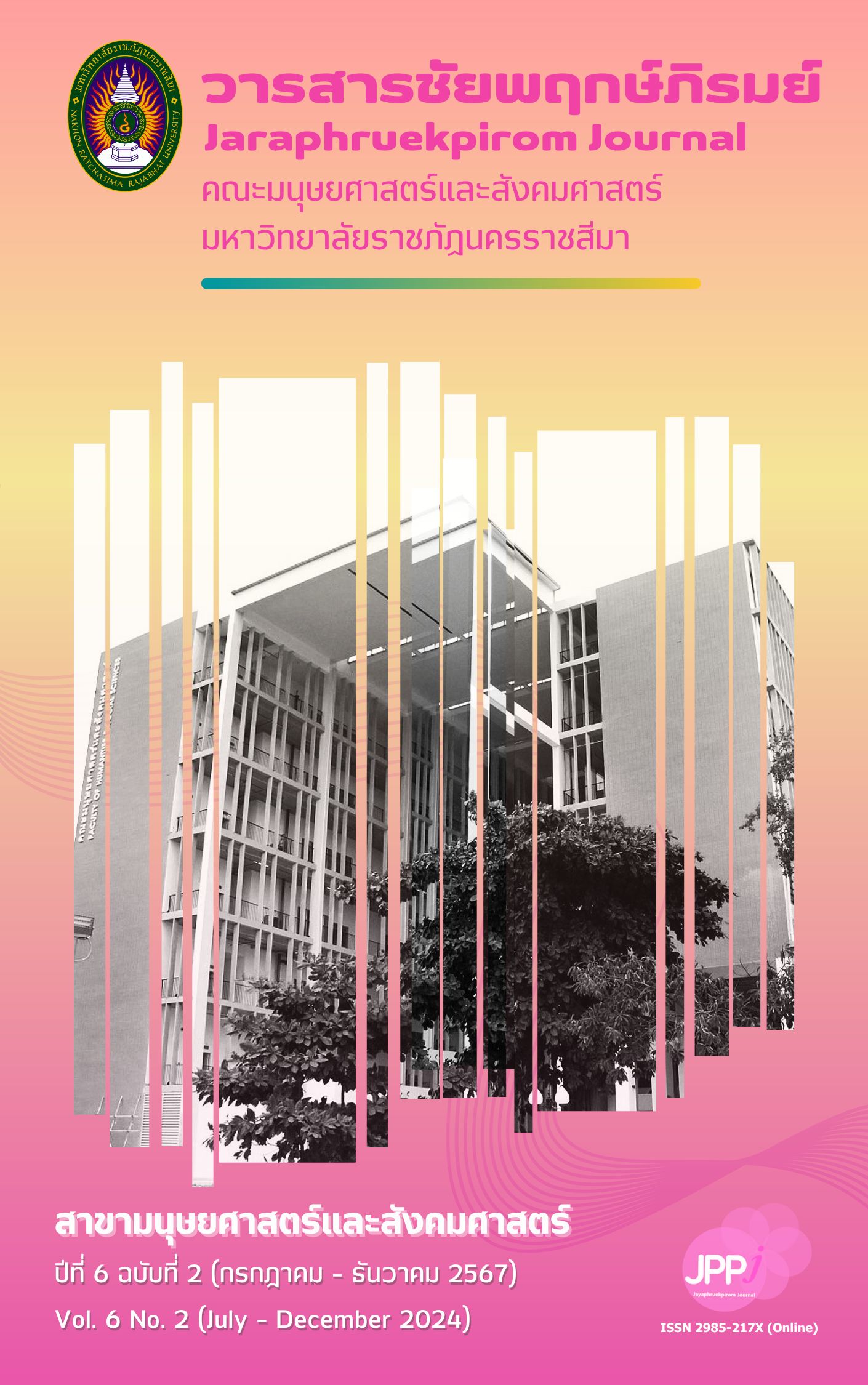การสำรวจผลกระทบของปัญญาประดิษฐ์และเครื่องมือดิจิทัลต่อการสอนการเขียนภาษาอังกฤษเป็นภาษาต่างประเทศในระดับอุดมศึกษา: การวิเคราะห์อภิมานของบริบททั้งระดับโลกและประเทศไทย
คำสำคัญ:
ปัญญาประดิษฐ์, เครื่องมือดิจิทัล, การสอนการเขียน EFL, อุดมศึกษา, บริบทประเทศไทยบทคัดย่อ
วัตถุประสงค์ของการวิเคราะห์อภิมานครั้งนี้คือการสำรวจผลกระทบของปัญญาประดิษฐ์ (AI) และเครื่องมือดิจิทัลต่อการสอนการเขียนภาษาอังกฤษเป็นภาษาต่างประเทศ (EFL) ในระดับอุดมศึกษา โดยเน้นประสิทธิภาพในการเสริมสร้างทักษะด้านไวยากรณ์ ความเชื่อมโยงของเนื้อหา และคำศัพท์ การศึกษาได้ทบทวนบทความที่ผ่านการตรวจสอบจากผู้เชี่ยวชาญซึ่งตีพิมพ์ระหว่างปี 2010 ถึง 2024 โดยรวบรวมผลการวิจัยเชิงปริมาณและเชิงคุณภาพโดยใช้เทคนิคการวิเคราะห์อภิมาน เพื่อประเมินผลกระทบโดยรวมของเทคโนโลยีเหล่านี้ต่อผลลัพธ์การเขียน ผลการวิจัยแสดงให้เห็นว่าเครื่องมือ AI เช่น ระบบการสอนอัจฉริยะและซอฟต์แวร์ประเมินการเขียนอัตโนมัติให้ข้อเสนอแนะเฉพาะบุคคลที่ช่วยปรับปรุงประสิทธิภาพการเขียนและการมีส่วนร่วมของนักเรียนอย่างมีนัยสำคัญ เครื่องมือดิจิทัล เช่น แพลตฟอร์มการเขียนออนไลน์และซอฟต์แวร์การทำงานร่วมกันส่งเสริมการเรียนรู้ที่มีการปฏิสัมพันธ์และเน้นนักเรียนเป็นศูนย์กลาง โดยเฉพาะอย่างยิ่งในบริบทของการศึกษาไทยที่วิธีการแบบดั้งเดิมมักจะไม่เพียงพอ แม้ว่าจะมีศักยภาพ แต่ความท้าทาย เช่น การเข้าถึงเทคโนโลยีที่จำกัดและระดับความรู้ดิจิทัลที่แตกต่างกันก็ยังเป็นอุปสรรคต่อการนำไปใช้ได้อย่างมีประสิทธิภาพ การศึกษานี้เน้นถึงศักยภาพในการเปลี่ยนแปลงของ AI และเครื่องมือดิจิทัลในการให้ประสบการณ์การเรียนรู้ที่เป็นส่วนตัวและมีประสิทธิภาพใน การสอนการเขียน EFL ผู้กำหนดนโยบายควรให้ความสำคัญกับเทคโนโลยีเหล่านี้โดยการจัดสรรเงินทุนสำหรับโครงสร้างพื้นฐานด้านเทคโนโลยีและการพัฒนาวิชาชีพสำหรับครู นอกจากนี้งานวิจัยในอนาคตควรมุ่งเน้นไปที่การขยายการเข้าถึงเครื่องมือเหล่านี้ การพัฒนาสื่อการสอนที่สอดคล้องกับวัฒนธรรม และการสำรวจผลกระทบระยะยาวต่อทักษะการเขียนเพื่อแจ้งการตัดสินใจด้านนโยบายและปรับปรุงการสอนใน EFL
เอกสารอ้างอิง
Abdel-Hack, E., & Ahmed Helwa, H. S. (2014). Using digital storytelling and weblogs instruction to enhance EFL narrative writing and critical thinking skills among EFL majors at faculty of education. Educational Research, 5(1), 8-41.
Al-Hammadi, F., & Sidek, H. (2014). An analytical framework for analysing secondary EFL writing curriculum: Approaches for writing and preparation for higher education. International Education Studies, 8(1), 59-70. https://doi.org/10.5539/ies.v8n1p59
Bacha, N. (2010). Teaching the academic argument in a university EFL environment. Journal of English for Academic Purposes, 9(4), 229-241. https://doi.org/10.1016/j.jeap.2010.05.001
Boonsuk, Y., & Ambele, E. A. (2021). Existing EFL pedagogies in Thai higher education: Views from Thai university lecturers. Arab World English Journal, 12(2), 113-128. https://doi.org/10.24093/awej/vol12no2.9
Chanwaiwit, P., & Inpin, B. (2021). Synchronous collaborative writing instruction in a university EFL context: Challenges and solutions. World Journal on Educational Technology: Current Issues, 13(4), 571-581. https://doi.org/10.18844/wjet.v13i4.6259
Chen, Z., & Goh, C. (2011). Teaching oral English in higher education: Challenges to EFL teachers. Teaching in Higher Education, 16(3), 333-345. https://doi.org/10.1080/13562517.2010.546527
Dahal, B. K., & Gyawali, Y. P. (2022). Using English as a medium of instruction in EFL context in higher education. Marsyangdi Journal, 3(1), 51-65. https://doi.org/10.3126/mj.v3i1.47951
Dousti, M., Amirian, Z., & Nejadansari, D. (2021). Application of WebQuest-based instruction in higher education context: EFL students’ achievement in writing skill. Journal of English Language Teaching and Learning, 13(29), 113-136. https://doi.org/10.22034/elt.2021.42866.2312
Dueraman, B. (2015). The crucial point in time where Thai students are introduced to English language writing. English Language Teaching, 8(9), 96-103. https://doi.org/10.5539/elt.v8n9p96
Guo, Q., & Xu, Y. (2020). Formative assessment use in university EFL writing instruction: A survey report from China. Asia Pacific Journal of Education, 41(2), 221-237. https://doi.org/10.1080/02188791.2020.1798737
Hendrajaya, M. R. (2023). EFL teachers' perceptions of online education amidst COVID-19 pandemic in Thailand. European Proceedings of Educational Sciences, 12, 115-125. https://doi.org/10.15405/epes.23097.34
Hsiao, J.-C., & Chang, J. J. S. (2023). Enhancing EFL reading and writing through AI-powered tools: Design, implementation, and evaluation of an online course. Interactive Learning Environments, 31(3), 295-310. https://doi.org/10.1080/10494820.2023.2207187
Hwang, W.-Y., Nurtantyana, R., Purba, S. W. D., Hariyanti, U., & Surjono, H. D. (2023). AI and recognition technologies to facilitate English as a foreign language writing. Journal of Educational Computing Research, 61(5), 883-905. https://doi.org/10.1177/07356331221137253
Kawinkoonlasate, P. (2021). A study of using e-writing instructional design program to develop English writing ability of Thai EFL learners. English Language Teaching, 14(6), 43-52. https://doi.org/10.5539/elt.v14n6p43
Kim, V. (2018). Technology-enhanced feedback on student writing in the English-medium instruction classroom. English Teaching, 73(4), 29-41. https://doi.org/10.15858/engtea.73.4.201812.29
Miyazoe, T., & Anderson, T. (2010). Learning outcomes and students' perceptions of online writing: Simultaneous implementation of a forum, blog, and wiki in an EFL blended learning setting. System, 38(2), 185-199. https://doi.org/10.1016/j.system.2010.03.006
Shen, C., Shi, P., Guo, J., Xu, S., & Tian, J. (2023). From process to product: Writing engagement and performance of EFL learners under computer-generated feedback instruction. Frontiers in Psychology, 14, Article 1258286. https://doi.org/10.3389/fpsyg.2023.1258286
Song, C., & Song, Y. (2023). Enhancing academic writing skills and motivation: Assessing the efficacy of ChatGPT in AI-assisted language learning for EFL students. Frontiers in Psychology, 14, Article 1260843. https://doi.org/10.3389/fpsyg.2023.1260843
Suwarno, B., & Arasuli, A. (2018). Getting students to write English articles for publication: Student writers’ responses. International Journal of Applied Linguistics and English Literature, 7(7), 229-240. https://doi.org/10.7575/aiac.ijalel.v.7n.7p.229
Thi, T. P. H. (2019). The role of reflective teaching in improving writing skills for EFL students. Asian EFL Journal, 21(1), 140-155.
Wichanpricha, T. (2020). Roles of feedback to English writing improvement: Thai EFL novice writers in higher education. Journal of Educational and Social Research, 10(3), 133-140. https://doi.org/10.36941/jesr-2020-0115
Widiati, U., Rusdin, D., Indrawati, I., Marzuki, M., & Govender, N. (2023). The impact of AI writing tools on the content and organization of students’ writing: EFL teachers’ perspective. Cogent Education, 10, Article 2236469. https://doi.org/10.1080/2331186x.2023.2236469


